Events & Promotions
|
|

GMAT Club Daily Prep
Thank you for using the timer - this advanced tool can estimate your performance and suggest more practice questions. We have subscribed you to Daily Prep Questions via email.
Customized
for You
Track
Your Progress
Practice
Pays
Not interested in getting valuable practice questions and articles delivered to your email? No problem, unsubscribe here.
- Nov 19
12:30 PM EST
-01:30 PM EST
Learn how Keshav, a Chartered Accountant, scored an impressive 705 on GMAT in just 30 days with GMATWhiz's expert guidance. In this video, he shares preparation tips and strategies that worked for him, including the mock, time management, and more - Nov 18
11:00 AM PST
-12:00 PM PST
Join us in a live GMAT practice session and solve 30 challenging GMAT questions with other test takers in timed conditions, covering GMAT Quant, Data Sufficiency, Data Insights, Reading Comprehension, and Critical Reasoning questions. - Nov 20
01:30 PM EST
-02:30 PM IST
Learn how Kamakshi achieved a GMAT 675 with an impressive 96th %ile in Data Insights. Discover the unique methods and exam strategies that helped her excel in DI along with other sections for a balanced and high score. - Nov 22
11:00 AM IST
-01:00 PM IST
Do RC/MSR passages scare you? e-GMAT is conducting a masterclass to help you learn – Learn effective reading strategies Tackle difficult RC & MSR with confidence Excel in timed test environment - Nov 23
11:00 AM IST
-01:00 PM IST
Attend this free GMAT Algebra Webinar and learn how to master the most challenging Inequalities and Absolute Value problems with ease. - Nov 24
07:00 PM PST
-08:00 PM PST
Full-length FE mock with insightful analytics, weakness diagnosis, and video explanations! - Nov 25
10:00 AM EST
-11:00 AM EST
Prefer video-based learning? The Target Test Prep OnDemand course is a one-of-a-kind video masterclass featuring 400 hours of lecture-style teaching by Scott Woodbury-Stewart, founder of Target Test Prep and one of the most accomplished GMAT instructors.
Kudos
Bookmarks
ᅠᅠResearchers: Ethicists (philosophers of ethics) devote their careers to reflecting on morality and presumably care deeply about it. Moral reflection tends to promote moral behavior, and ethicists tend to be both more prone to and more skilled at moral reflection than non-ethicists. Given that the philosophical ethical theories of ethicists broadly agree with widely accepted moral standards, we expect that ethicists would tend to be better behaved than non-ethicists with regard to widely accepted moral standards.
ᅠᅠTo test this expectation we surveyed some of the attendees of a philosophical conference to assess whether people who have contact with ethicists believe that ethicists are, indeed, particularly well-behaved with regard to widely accepted moral standards. Respondents to the survey belonged to exactly one of two categories: ethicists and other philosophers (non- ethicists). Each was asked to evaluate the moral behavior of ethicists as compared to that of other philosophers and to that of non-academics. Each respondent provided an answer to each question in the survey.
ᅠᅠTo test this expectation we surveyed some of the attendees of a philosophical conference to assess whether people who have contact with ethicists believe that ethicists are, indeed, particularly well-behaved with regard to widely accepted moral standards. Respondents to the survey belonged to exactly one of two categories: ethicists and other philosophers (non- ethicists). Each was asked to evaluate the moral behavior of ethicists as compared to that of other philosophers and to that of non-academics. Each respondent provided an answer to each question in the survey.
35%
Be sure to select an answer first to save it in the Error Log before revealing the correct answer (OA)!
Difficulty:
 35%
(medium)
35%
(medium)
Question Stats:
63% (02:42) correct 37%
(02:59)
wrong
37%
(02:59)
wrong  based on 657
sessions
based on 657
sessions
History
Date
Time
Result
Not Attempted Yet
Of the following percentages, which one is closest to the percent of the ethicist respondents who rated the moral behavior of ethicists as better than the moral behavior of other philosophers?
| 35% | |
| 40% | |
| 45% | |
| 50% | |
| 55% |
How many people attended the philosophical conference?: No
How many of the conference attendees were respondents to the survey?: Yes
How many respondents rated the moral behavior of ethicists as worse than the behavior of other philosophers?: Yes
Be sure to select an answer first to save it in the Error Log before revealing the correct answer (OA)!
Difficulty:
 25%
(medium)
25%
(medium)
Question Stats:
69% (01:01) correct 31%
(01:11)
wrong
31%
(01:11)
wrong  based on 661
sessions
based on 661
sessions
History
Date
Time
Result
Not Attempted Yet
For each of the following questions, select Yes if that question can be answered using only the information provided. Otherwise, select No.
| Yes | No | |
| How many people attended the philosophical conference? | ||
| How many of the conference attendees were respondents to the survey? | ||
| How many respondents rated the moral behavior of ethicists as worse than the behavior of other philosophers? |
ShowHide Answer
Official Answer
How many people attended the philosophical conference?: No
How many of the conference attendees were respondents to the survey?: Yes
How many respondents rated the moral behavior of ethicists as worse than the behavior of other philosophers?: Yes
A majority reported that ethicists’ moral behavior was about the same as that of other philosophers.: No
They tend to be more skilled at moral reflection than are ethicists.: No
They were more likely to report better moral behavior by ethicists relative to the comparison groups than they were to report worse moral behavior.: Yes
Be sure to select an answer first to save it in the Error Log before revealing the correct answer (OA)!
Difficulty:
 95%
(hard)
95%
(hard)
Question Stats:
38% (02:01) correct 62%
(02:04)
wrong
62%
(02:04)
wrong  based on 817
sessions
based on 817
sessions
History
Date
Time
Result
Not Attempted Yet
For each of the following statements about the non-ethicist philosophers surveyed, select Yes if it accurately reflects the information provided. Otherwise, select No.
| Yes | No | |
| A majority reported that ethicists’ moral behavior was about the same as that of other philosophers. | ||
| They tend to be more skilled at moral reflection than are ethicists. | ||
| They were more likely to report better moral behavior by ethicists relative to the comparison groups than they were to report worse moral behavior. |
ShowHide Answer
Official Answer
A majority reported that ethicists’ moral behavior was about the same as that of other philosophers.: No
They tend to be more skilled at moral reflection than are ethicists.: No
They were more likely to report better moral behavior by ethicists relative to the comparison groups than they were to report worse moral behavior.: Yes
Official Mock 6:

2024-09-01_14-56-31.png [ 101.49 KiB | Viewed 7830 times ]
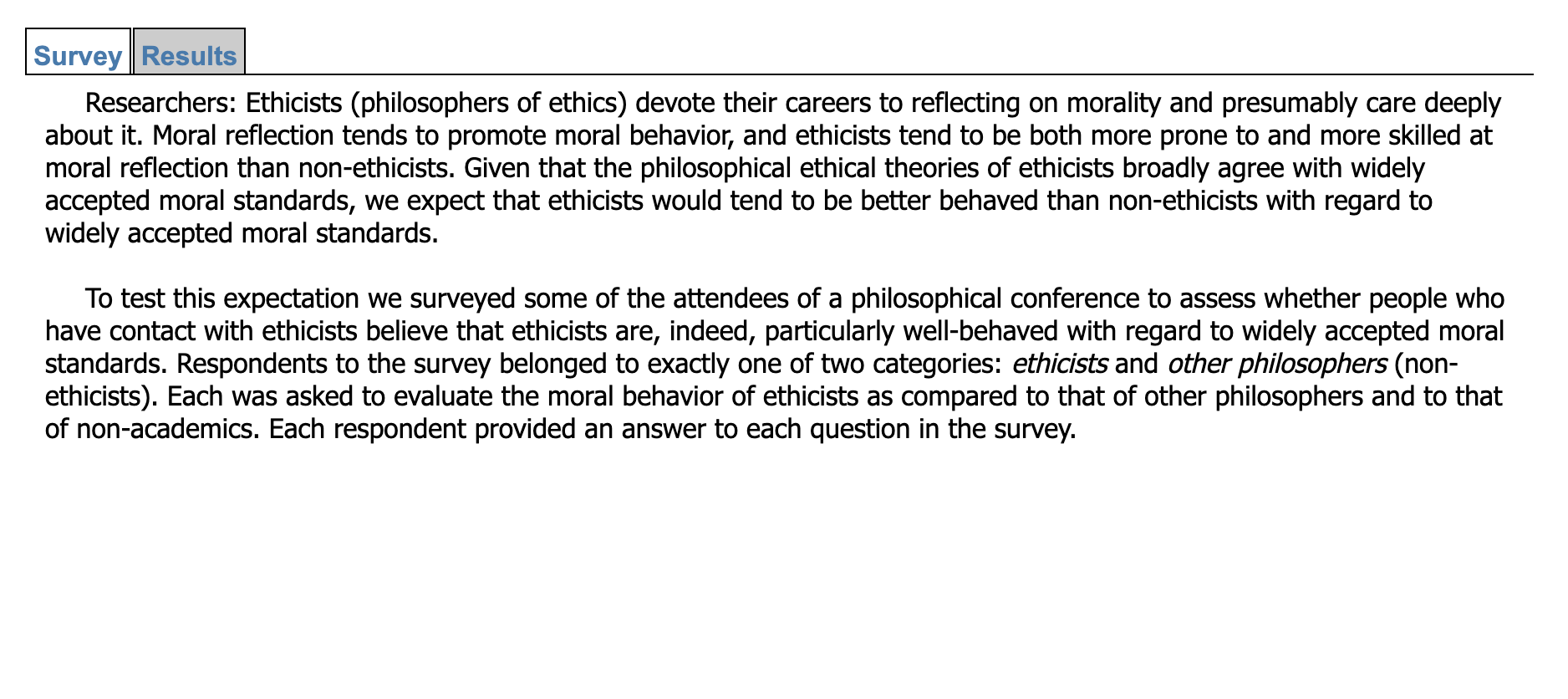
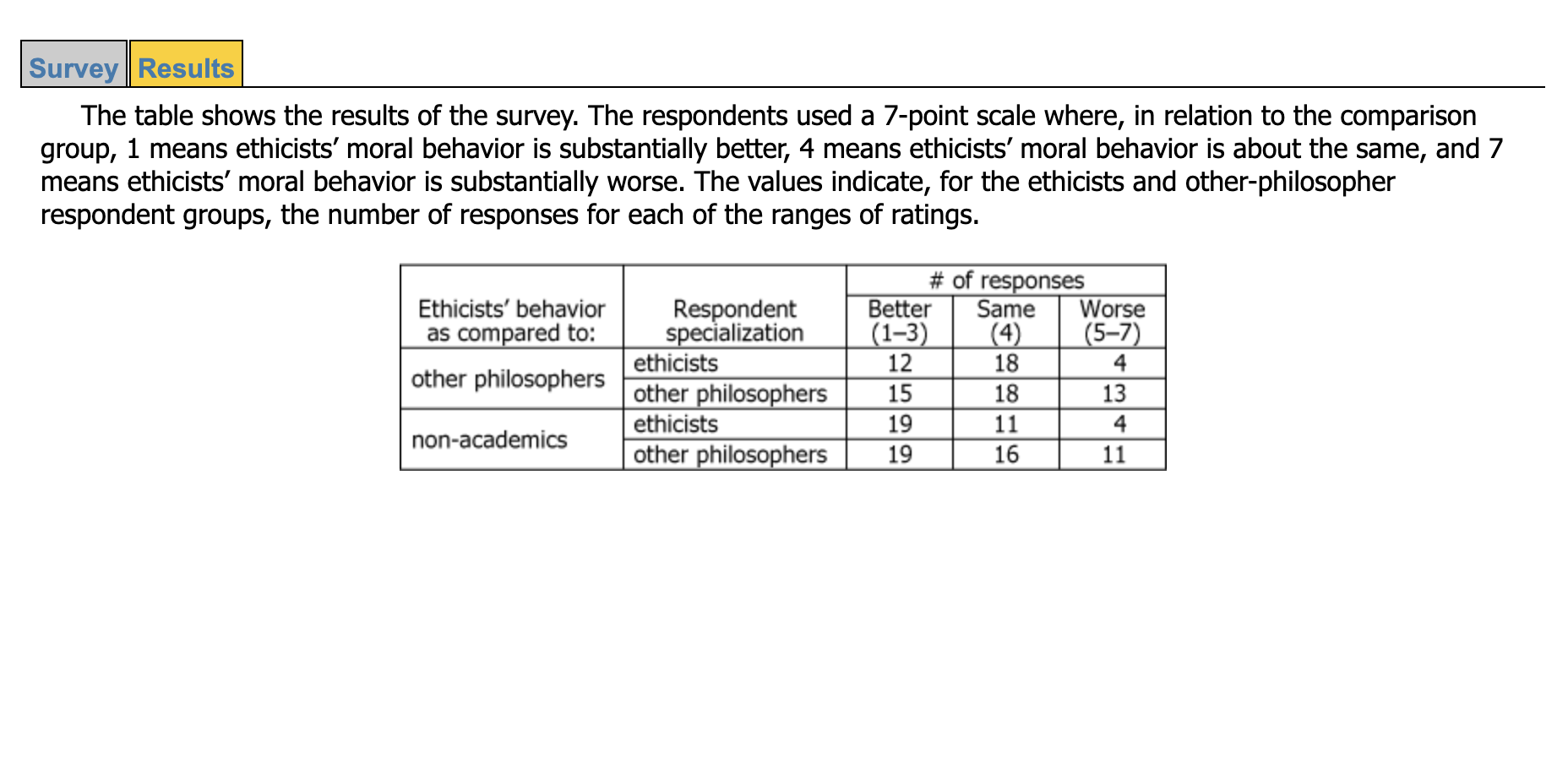
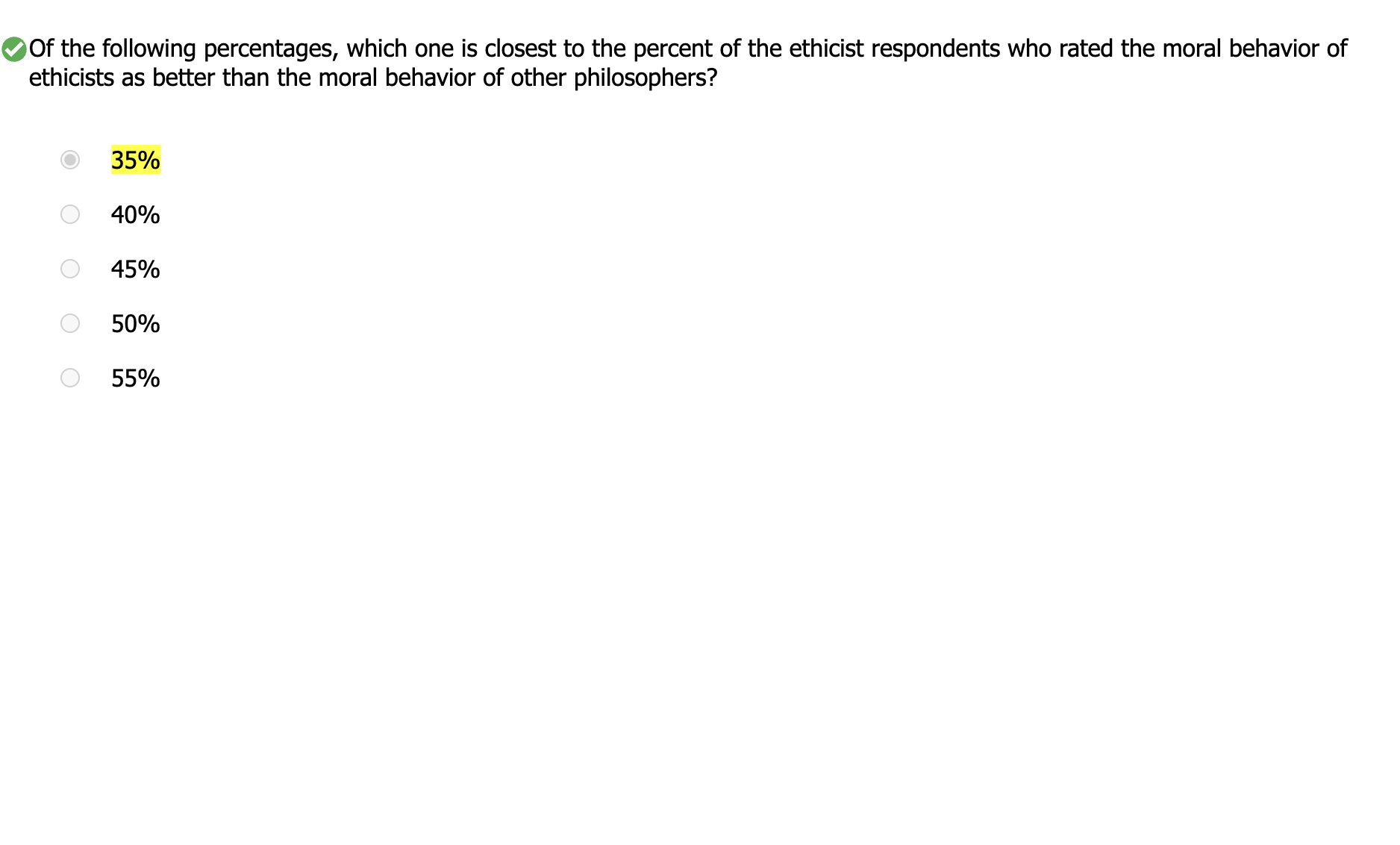
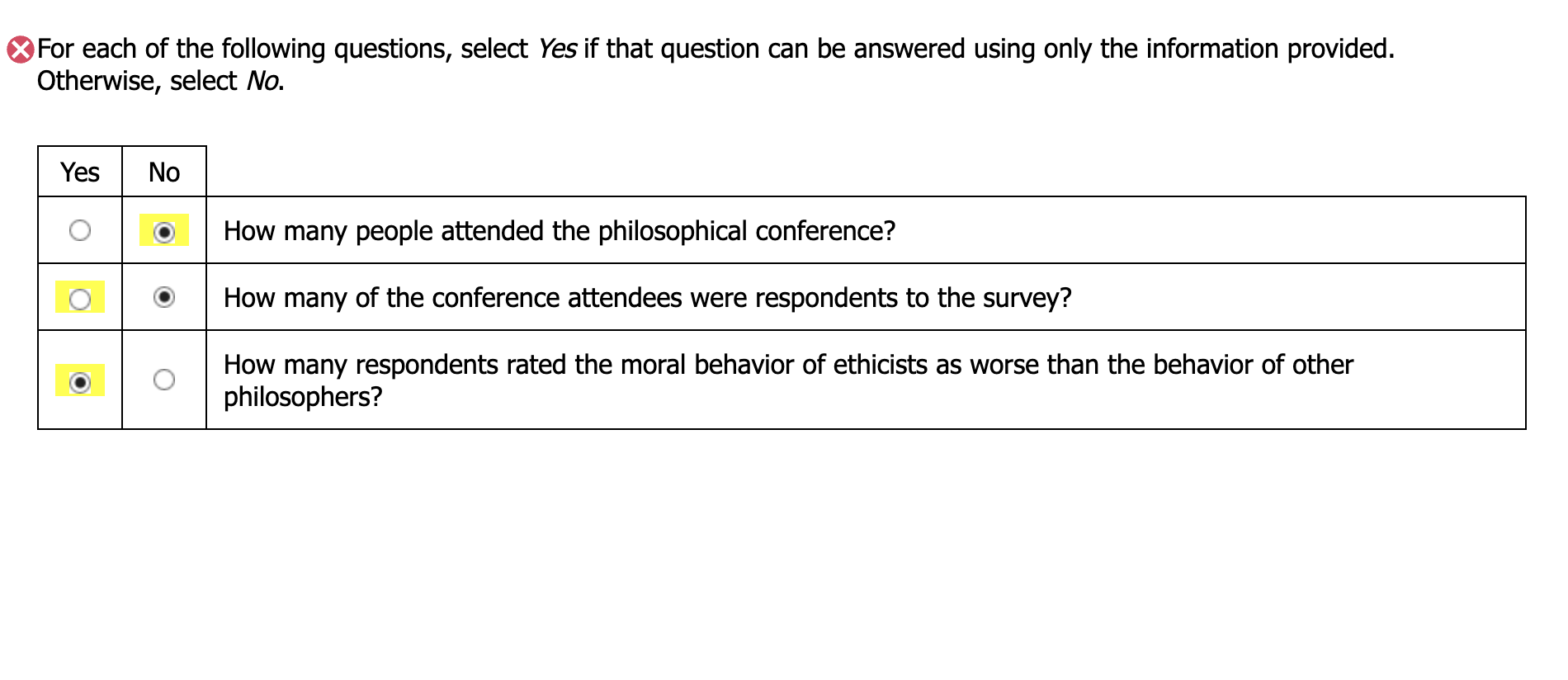
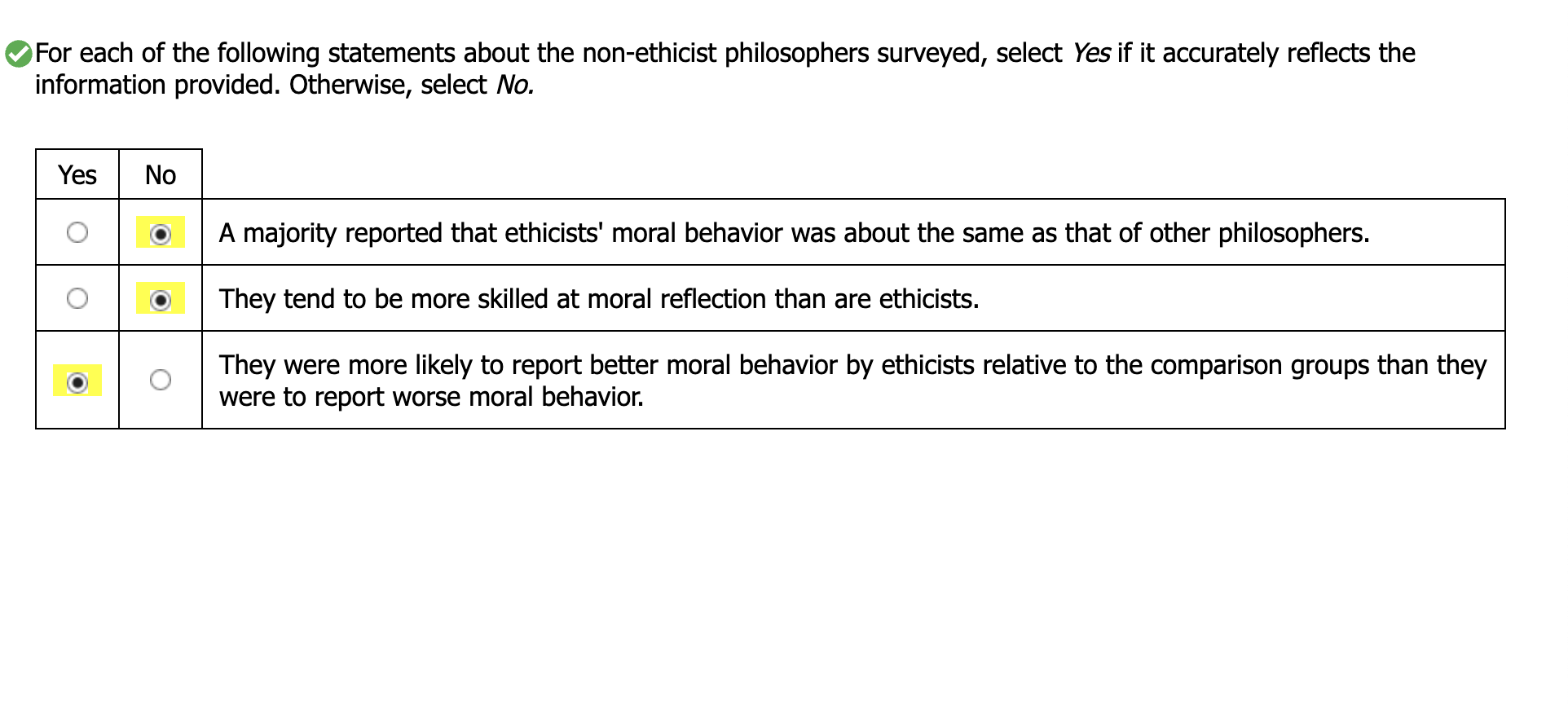
Attachment:
2024-09-01_14-56-31.png [ 101.49 KiB | Viewed 7830 times ]
Kudos
Bookmarks
Question 1:
1. We are asked to find the "percent of the ethicist respondents who rated the moral behavior of ethicists as better than the moral behavior of other philosophers".
2. For the 1st column, we are comparing ethicists' behavior to other philosophers.
3. In the 2nd column, we are considering ethicist respondents.
4. The percent is equal to the number of responses in that row, which selected "Better", divided by the total amount of responses there. In other words, the percentage will equal \(\frac{12}{12+18+4} = \frac{12}{34} \approx 35\%\).
Question 2:
1. "How many people attended the philosophical conference?" If we look through the text, we can find that "we surveyed some of the attendees of a philosophical conference". This means that the data doesn't include the total number of attendees. So, there isn't enough information.
2. "How many of the conference attendees were respondents to the survey?" We can find this number by summing up either the top two rows with numbers, or the bottom two rows. So, there is enough information.
3. "How many respondents rated the moral behavior of ethicists as worse than the behavior of other philosophers?" Using a similar strategy as in Question 1, we can search the row with comparing to other philosophers and the column "Worse". We have two values - 4 and 13 - the sum of which is our answer. So, there is enough information.
Question 3:
1. "A majority reported that ethicists’ moral behavior was about the same as that of other philosophers". Here, we look at the row with comparing to other philosophers and the row with the respondent specialization as other philosophers. Now compare the sum of values in column "Same" with all responses. We get: \(\frac{18}{(15)+(18)+(13)} = \frac{18}{46} < \frac{23}{46} = 50\%\). So, the statement doesn't accurately reflect the information.
2. "They tend to be more skilled at moral reflection than are ethicists". However, the text says differently: "ethicists tend to be both more prone to and more skilled at moral reflection than non-ethicists". So, the statement doesn't accurately reflect the information.
3. "They were more likely to report better moral behavior by ethicists relative to the comparison groups than they were to report worse moral behavior". Let's consider the 2 rows with the respondent being other philosophers and compare the number of responses in the "Better" column to the "Worse" column. We get that the values are larger in the "Better" column: 15 > 13 and 19 > 11. So, the statement does accurately reflect the information.
1. We are asked to find the "percent of the ethicist respondents who rated the moral behavior of ethicists as better than the moral behavior of other philosophers".
2. For the 1st column, we are comparing ethicists' behavior to other philosophers.
3. In the 2nd column, we are considering ethicist respondents.
4. The percent is equal to the number of responses in that row, which selected "Better", divided by the total amount of responses there. In other words, the percentage will equal \(\frac{12}{12+18+4} = \frac{12}{34} \approx 35\%\).
Question 2:
1. "How many people attended the philosophical conference?" If we look through the text, we can find that "we surveyed some of the attendees of a philosophical conference". This means that the data doesn't include the total number of attendees. So, there isn't enough information.
2. "How many of the conference attendees were respondents to the survey?" We can find this number by summing up either the top two rows with numbers, or the bottom two rows. So, there is enough information.
3. "How many respondents rated the moral behavior of ethicists as worse than the behavior of other philosophers?" Using a similar strategy as in Question 1, we can search the row with comparing to other philosophers and the column "Worse". We have two values - 4 and 13 - the sum of which is our answer. So, there is enough information.
Question 3:
1. "A majority reported that ethicists’ moral behavior was about the same as that of other philosophers". Here, we look at the row with comparing to other philosophers and the row with the respondent specialization as other philosophers. Now compare the sum of values in column "Same" with all responses. We get: \(\frac{18}{(15)+(18)+(13)} = \frac{18}{46} < \frac{23}{46} = 50\%\). So, the statement doesn't accurately reflect the information.
2. "They tend to be more skilled at moral reflection than are ethicists". However, the text says differently: "ethicists tend to be both more prone to and more skilled at moral reflection than non-ethicists". So, the statement doesn't accurately reflect the information.
3. "They were more likely to report better moral behavior by ethicists relative to the comparison groups than they were to report worse moral behavior". Let's consider the 2 rows with the respondent being other philosophers and compare the number of responses in the "Better" column to the "Worse" column. We get that the values are larger in the "Better" column: 15 > 13 and 19 > 11. So, the statement does accurately reflect the information.
General Discussion
Kudos
Bookmarks
Bismuth83
I believe in Q3 in the first statement, we merely are focussing on the non-ethicist philosophers surveyed, like it is stated in the prompt. It would still be a NO but the calculation should be 18/46. Correct?














